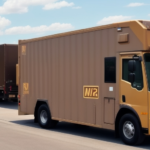How to Quote an International Package Using UPS Worldship
Expanding your business to international markets requires efficient shipping solutions. UPS Worldship is a powerful shipping management system that simplifies global shipping processes. This guide provides a comprehensive, step-by-step approach to quoting a package from another country using your UPS Worldship account. Learn why accurate quoting is essential, how to set up your account for international shipping, and best practices for weighing and labeling packages to ensure smooth deliveries.
Understanding UPS Worldship
UPS Worldship is a robust shipping software designed for businesses that need to manage large volumes of shipments. It offers features such as label printing, package tracking, and customs documentation management, making both domestic and international shipping seamless.
Key Features
- Integration Capabilities: Seamlessly integrates with inventory management and accounting systems to streamline operations.
- Customs Management: Simplifies international shipping by managing customs forms and regulations.
- Reporting and Analytics: Provides detailed insights into shipping costs and performance metrics.
Setting Up Your UPS Worldship Account for International Shipping
Before you can quote international packages, ensure your UPS Worldship account is configured correctly.
Step-by-Step Setup
- Create a UPS Account: Sign up for a UPS account if you haven't already.
- Install UPS Worldship: Download and install the latest version of UPS Worldship from the UPS website.
- Enable International Shipping: In Worldship, navigate to the settings and enable international shipping options.
- Download UPS Import Control: This tool helps manage shipments from foreign suppliers by providing pre-arrival shipment information. Visit the UPS Import Control page for more details.
Ensure you have all necessary customs documentation ready, including commercial invoices and certificates of origin, to prevent shipping delays.
Understanding International Shipping Regulations
International shipping involves navigating a complex landscape of regulations and requirements that vary by country.
Key Considerations
- Customs Compliance: Familiarize yourself with the import/export laws of both the origin and destination countries. Refer to the U.S. Customs and Border Protection for comprehensive guidelines.
- Prohibited and Restricted Items: Certain items may be restricted or prohibited in specific countries. Always check the destination country's regulations.
- Accurate Documentation: Ensure all paperwork, including commercial invoices and packing lists, is complete and accurate to avoid delays.
Calculating International Shipping Costs
The cost of shipping internationally depends on several factors, including package weight, dimensions, destination, and chosen shipping method.
Factors Influencing Cost
- Package Weight and Size: Heavier and larger packages incur higher shipping fees.
- Shipping Speed: Express shipping options are more expensive but offer faster delivery times.
- Destination Country: Shipping to remote or less accessible locations may cost more.
- Additional Services: Insurance, signature confirmation, and tracking services add to the overall cost.
Use the UPS Worldship quoting tool to input your package details and receive an accurate shipping estimate.
Best Practices for Weighing and Packaging International Shipments
Proper weighing and packaging are critical to ensure your package arrives safely and to avoid unexpected costs.
Accurate Weighing
- Use a Digital Scale: Invest in a reliable digital scale to ensure precise weight measurements.
- Include All Contents: Weigh the package with all contents and packaging materials to get an accurate total weight.
Optimal Packaging
- Choose Durable Materials: Use sturdy boxes and protective materials like bubble wrap or foam to safeguard your items.
- Seal Properly: Ensure all packages are securely sealed to prevent damage during transit.
- Label Clearly: Clearly label your package with both the sender's and recipient's addresses, and include any necessary handling instructions.
Completing Customs Forms Accurately
Accurate completion of customs forms is essential to prevent shipping delays and additional fees.
Essential Information
- Package Contents: Provide a detailed description of each item, including quantity, value, and country of origin.
- HS Codes: Use the Harmonized System codes to classify your goods correctly.
- Accurate Valuation: Declare the correct value of your items to avoid penalties.
For detailed instructions, refer to the UPS Customs Forms Guide.
Tracking and Managing Your International Shipments
UPS Worldship offers comprehensive tracking features to monitor your package throughout its journey.
Tracking Features
- Real-Time Updates: Receive real-time updates on your package's status and location.
- Exception Notifications: Get alerts for any delays or issues that arise during transit.
- Delivery Estimates: Provide accurate delivery estimates to your customers based on tracking information.
Utilize these features to keep your customers informed and address any issues promptly.
Avoiding Common Mistakes in International Quoting
To ensure a smooth international shipping experience, be aware of and avoid common pitfalls.
Common Mistakes
- Incomplete Documentation: Missing or inaccurate customs forms can result in delays or fines.
- Incorrect Weight and Dimensions: Misreported package size or weight can lead to unexpected costs.
- Ignoring Local Regulations: Failing to comply with destination country regulations can cause shipment rejections.
- Poor Packaging: Inadequate packaging increases the risk of damage during transit.
Preventive Measures
- Double-Check Information: Verify all package details and documentation before shipping.
- Stay Informed: Keep up-to-date with international shipping regulations and UPS Worldship updates.
- Use Reliable Tools: Leverage UPS Worldship's features to automate and validate shipping information.
Conclusion
Quoting and managing international shipments using UPS Worldship can significantly enhance your global shipping efficiency. By following the steps outlined in this guide—setting up your account correctly, understanding regulations, accurately calculating costs, and avoiding common mistakes—you can ensure smooth and cost-effective international deliveries.
For more detailed information and the latest updates, visit the UPS Worldship Services page.






















